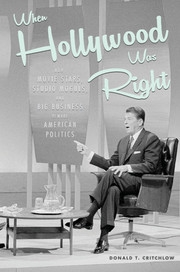3 - The Red Scare Hits Hollywood
Published online by Cambridge University Press: 05 October 2013
Summary
At 10:30 a.m., Monday October 20, 1947, in Washington, D.C., the first public hearings of the House Un-American Activities Committee (HUAC) investigating communism in the film industry opened. Television cameras, newspaper reporters, radio announcers, and a standing-room-only crowd filled the Caucus Room of the Old House Office Building. A battery of nine newsreel cameras lined the room. Overhead, a great crystal chandelier lit the room, its ordinary bulbs replaced by high-intensity lamps. On the right side of the room stood a control panel and other broadcasting equipment. Loudspeakers of a public address system amplified every sound. On the rostrum were three microphones. Additional microphones had been placed on the witness table, and several more stood on chief investigator Robert Stripling’s table. The public waited in long lines to get into the hearing room. The nation’s capital was giddy with excitement as it awaited the parade of Hollywood glitterati standing in the wings for their cue to appear.
J. Parnell Thomas, Republican from New Jersey, chaired the hearings. A short, red-faced man with sparse gray hair, he was known for his political grandstanding. As a member of the Dies Committee in the 1930s, he emerged as a persistent voice trying to link Roosevelt’s administration to a larger communist conspiracy. Republican leaders, including presidential hopeful Thomas Dewey and the Speaker of the House Joe Martin, had tried to persuade Thomas to call off the hearings, but Hollywood was too much of a publicity lure for Thomas to pass up. When he entered the hearing room, cameramen asked him to rise and make his entrance again. They placed a pillow on the seat of his chair to make sure he sat high enough to be captured on film.
- Type
- Chapter
- Information
- When Hollywood Was RightHow Movie Stars, Studio Moguls, and Big Business Remade American Politics, pp. 76 - 108Publisher: Cambridge University PressPrint publication year: 2013



